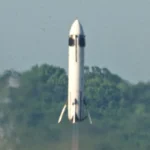Honda Motor Co.’s research arm conducted its first successful launch and landing test of an experimental reusable rocket, marking another entry by a Japanese automaker into the increasingly crowded space sector.
The 6.3-meter rocket reached an altitude of 271 meters before landing within 37 centimeters of its target at Honda’s facility in Hokkaido on Monday. The test represents Honda’s first rocket landing after reaching significant altitude, though the company cautioned that no commercialization decisions have been made.
Honda’s space ambitions remain modest compared to established players. The automaker, which began rocket research in 2021, aims to achieve suborbital capability by 2029 — a timeline that puts it years behind SpaceX and Blue Origin’s operational vehicles. The company acknowledged its rocket research remains “in the fundamental research phase.”
The announcement comes as Japan accelerates efforts to expand its space industry. The government has allocated ¥1 trillion ($6.9 billion) over 10 years to support space technology development, targeting to double the industry’s size to ¥8 trillion ($55.2 billion) by the early 2030s.
Honda’s rival Toyota has already invested in rocket maker Interstellar Technologies, while numerous Japanese startups are pursuing public listings to fund space ventures. Honda’s late entry and uncertain commercial prospects highlight the challenges facing traditional manufacturers expanding beyond their core automotive expertise.





